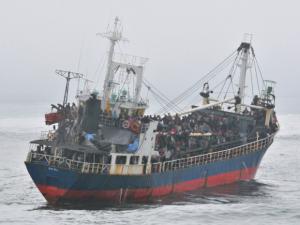World Refugee Day - looking deeper into the issue : Reality or daydream for Tamils? TGTE
Despite the end of open conflict. Tamils are still subject to
oppression, arbitrary arrests, detention, torture and rape. Their rights continue to be infringed on
because of their ethnicity.
NEW YORK, USA, June 20, 2014 /EINPresswire.com/ -- — Transnational Government of Tamil Eelam (TGTE)
World Refugee Day is a poignant time to look into the deeper root causes of why people are
forced to flee their homes and become refugees, said the Transnational Government of Tamil
Eelam (TGTE) today.
While war and conflict are often the main reason as to why people are forced to become
refugees, the end of war does not always mean that the flow of refugees will stop, nor does the
end of a war mean that the country of origin is safe to return to.
“Much has been made about the end of the civil war in Sri Lanka, however, less and less is being
said about the continued persecution of Tamils in Sri Lanka,” said Mr Visuvanathan
Rudrakumaran.
“Despite the end of open conflict, root causes have not been addressed. Tamils are still subject to
oppression, arbitrary arrests, detention, torture and rape. Their rights continue to be infringed on
because of their ethnicity.
“While this continues there will always be people who are desperate to escape. They will risk life
and limb for a chance to live in peace- so the flow of refugees will not stop.
“The TGTE is appealing to the international community to recognise the continued oppression of
the Tamil people. Refugees that come to your shores, do so because they are out of option.
“We are highly worried at the growing trend of returning refugees or asylum seekers because of
the misconception that the end of the war in Sri Lanka has heralded in an era of peace. This is
not the case. Returnees face an even higher risk. Their plight is well documented.
The TGTE-Center for Refugee is committed to assisting third party countries in any way we can
to help with Tamil refugees, we just ask that they not be returned to Sri Lanka where their life will
be at risk,” said Mr V.Rudrakumaran.
BACKGROUND:
Tamils have faced repeated mass killings since 1958 and the killings in 2009 prompted UN Secretary General Ban Ki-moon to appoint a Panel of Experts to report on the scale of killings.
According to the report by this UN Panel, tens of thousands of Tamil civilians were killed (UN Internal Review Report on Sri Lanka: over 70,000 Tamils were killed in five months in 2009).
These people were killed due to deliberate and intense shelling and bombing of areas designated by the government as "no-fire zones", where Tamil civilians had assembled for safety. The Sri Lankan Government also restricted food and medicine for Tamils, resulting in large numbers of people dying from starvation and many of the injured bleeding to death.
According to the UN Panel, the killings and other abuses that took place amount to war crimes and crimes against humanity. Independent experts believe that there are elements of these abuses that constitute an act of genocide.
According to a May 2012 report by the British Foreign and Commonwealth Office on Human Rights and Democracy; there are up to 90,000 Tamil war widows in the North & East of Sri Lanka. A book "Unfinished War: Torture and Sexual Violence in Sri Lanka: 2009 - 2014 highlight the continuing sexual abuses by the Sri Lankan Security forces.
UN Human Rights Council in March 2014 established an international war crimes investigation for these killings.
Members of the Sri Lankan security forces are almost exclusively from the Sinhalese community and the victims are all from the Tamil community.
Tamils overwhelmingly voted in an election in 1977 to establish an independent and sovereign country Tamil Eelam. This election was conducted by the Sri Lankan Government.
ABOUT TRANSNATIONAL GOVERNMENT OF TAMIL EELAM (TGTE):
Transnational Government of Tamil Eelam (TGTE) is a democratically elected Government of Tamils (from the island of Sri Lanka) living in several countries.
It held internationally supervised elections among Tamils around the world to elect over 132 Members of Parliament and is leading a campaign to realize Tamils’ political aspirations through peaceful, diplomatic and democratic means.
TGTE has a bicameral legislature and a Cabinet and held one of its Parliamentary sittings in the British Parliament.
The Constitution of the TGTE mandates that it should realize its political objective only through peaceful means.
The Prime Minister of TGTE is Mr. Visuvanathan Rudrakumaran, a New York based lawyer.
David Matas
Legal Advisor, TGTE Center for Refugees
44-7896-588-369
email us here

